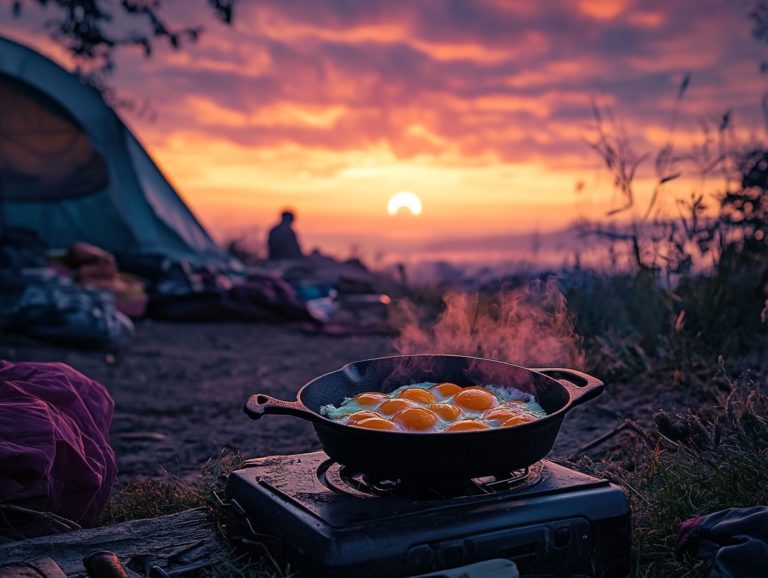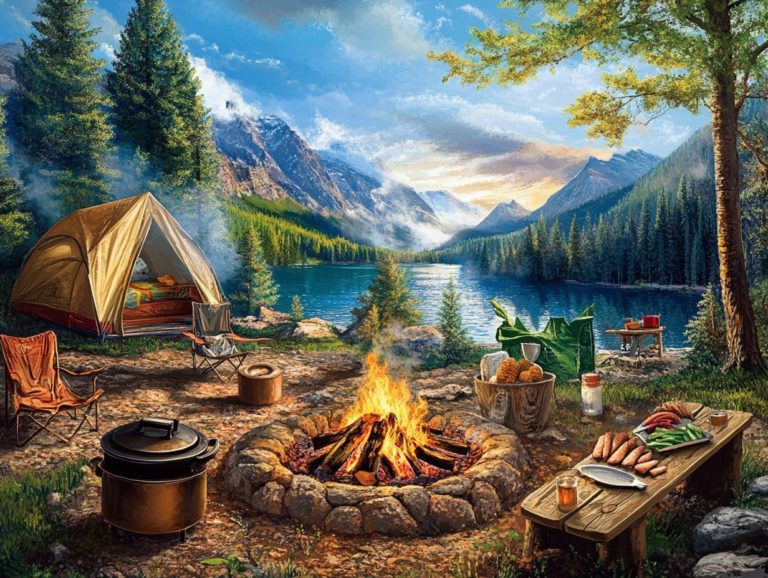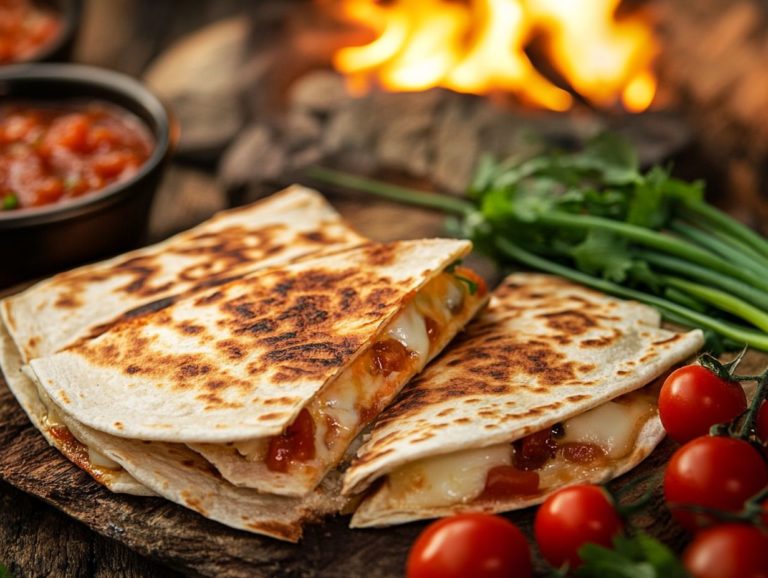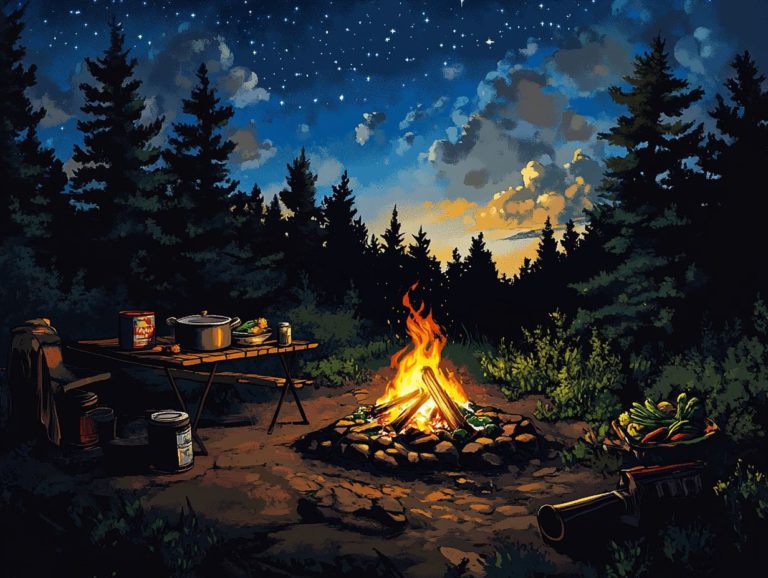Best Practices for Food Safety While Camping
Camping provides a splendid escape into the great outdoors. However, it also presents distinct challenges, particularly regarding food safety and foodborne pathogens.
Ensuring your meals are safe to eat is vital for enjoying a worry-free outdoor experience. This article delves into the potential risks of foodborne illnesses while you’re out in the wild. It offers essential tips for proper food storage, preparation, and effective waste management practices to prevent contamination.
Whether you re nestled in a tent or traveling in an RV, you ll discover valuable insights to keep your camping culinary adventures safe and enjoyable.
Contents
- Key Takeaways:
- Importance of Food Safety While Camping
- Planning for Safe Food Storage
- Cooking and Preparing Food in the Wilderness
- Dealing with Waste and Sanitation
- Handling Food in Different Environments
- Frequently Asked Questions
- What are the best practices for food safety while camping?
- How can I store food properly while camping?
- What are some tips for keeping a clean campsite?
- Why is using a food thermometer important while camping?
- What should I do with leftover food while camping?
- Are there any foods I should avoid while camping?
Key Takeaways:
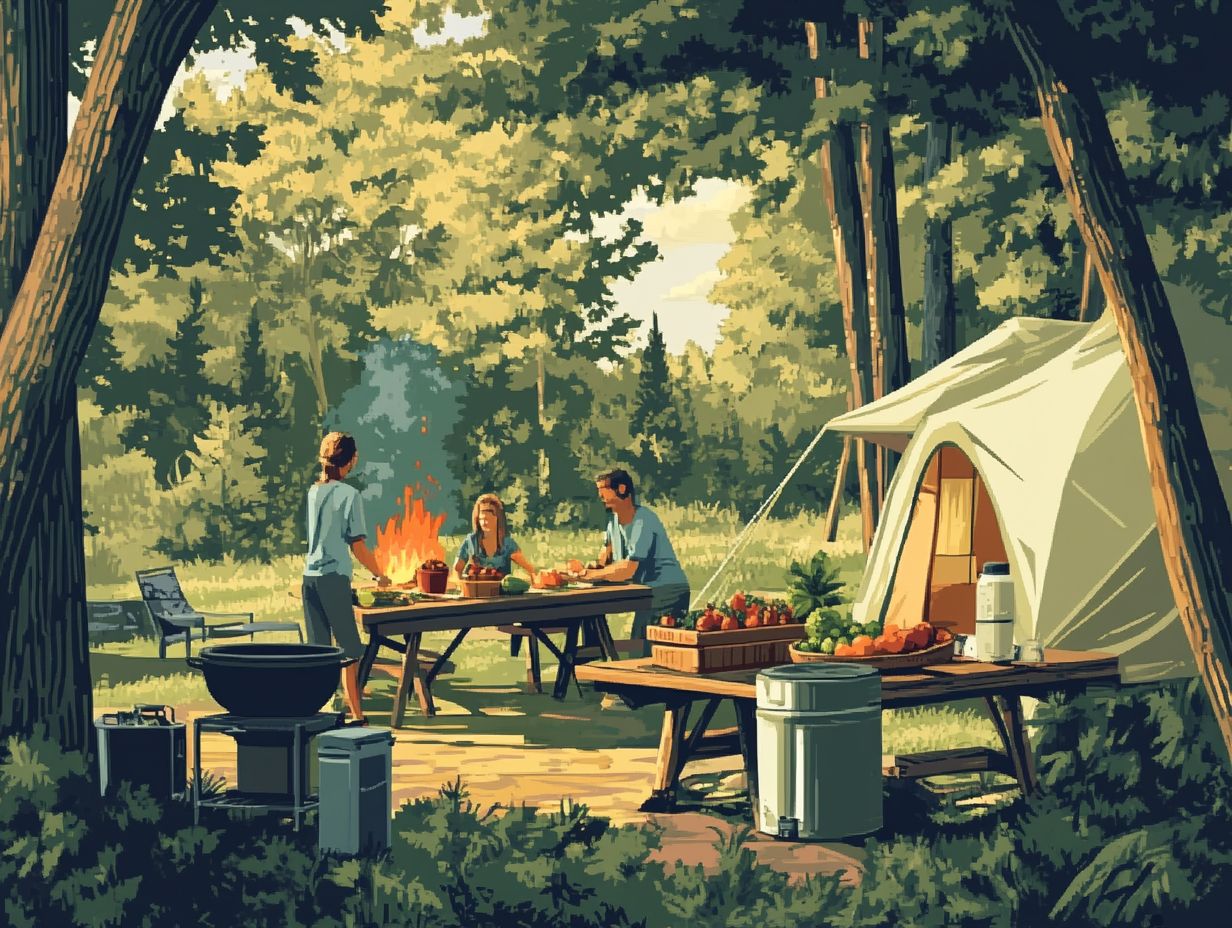
- Always pack food in airtight containers for safety. Keep perishables cold and separate raw and cooked items.
- Practice good hygiene and cooking methods. Wash your hands often and cook food thoroughly using a thermometer.
- Properly dispose of food and waste. Use designated garbage containers and follow Leave No Trace principles.
Importance of Food Safety While Camping
Food safety while camping is crucial for a healthy outdoor experience. Recognizing signs of food spoilage while camping is vital, especially with meat, chicken, eggs, and other foods that can spoil.
By maintaining cleanliness with your hands, surfaces, and containers, and using clean, treated water, you can significantly reduce contamination chances. Mastering safe food handling techniques keeps foodborne pathogens away, safeguarding your trip from illness.
With the right precautions in place, you can relish delicious meals without compromising your health.
Risks of Foodborne Illness in Outdoor Environments
Camping in the great outdoors offers a thrilling experience. However, it comes with unique challenges regarding food safety. To mitigate risks, it’s essential to follow the best practices for safe meal prep outdoors as various pathogens can thrive in natural environments, increasing your risk of foodborne illness.
For example, raw meats and dairy products are particularly vulnerable to harboring dangerous bacteria if not stored correctly. When wildlife is around, the risk of mixing raw food with cooked food escalates, making it essential to keep food sealed and elevated off the ground.
The warmth of summer can rapidly accelerate bacterial growth in perishable items. Refrigerate your food quickly to avoid dangerous bacteria!
By adopting strict food handling and sanitation practices like washing your hands before meals and using clean utensils you can significantly reduce these risks. This way, you can fully enjoy your outdoor adventures without compromising your health.
Planning for Safe Food Storage
When planning a camping trip, prioritizing safe food storage is essential to prevent foodborne illnesses and preserve the quality of your meals. This is especially important for meat, chicken, eggs, vegetables, and fruits.
By effectively managing temperature and utilizing appropriate containers, you can significantly enhance food safety while camping. Additionally, learning how to safely prepare meals in bear country ensures that your culinary experiences in nature are enjoyable and safe.
Tips for Packing and Storing Food Properly
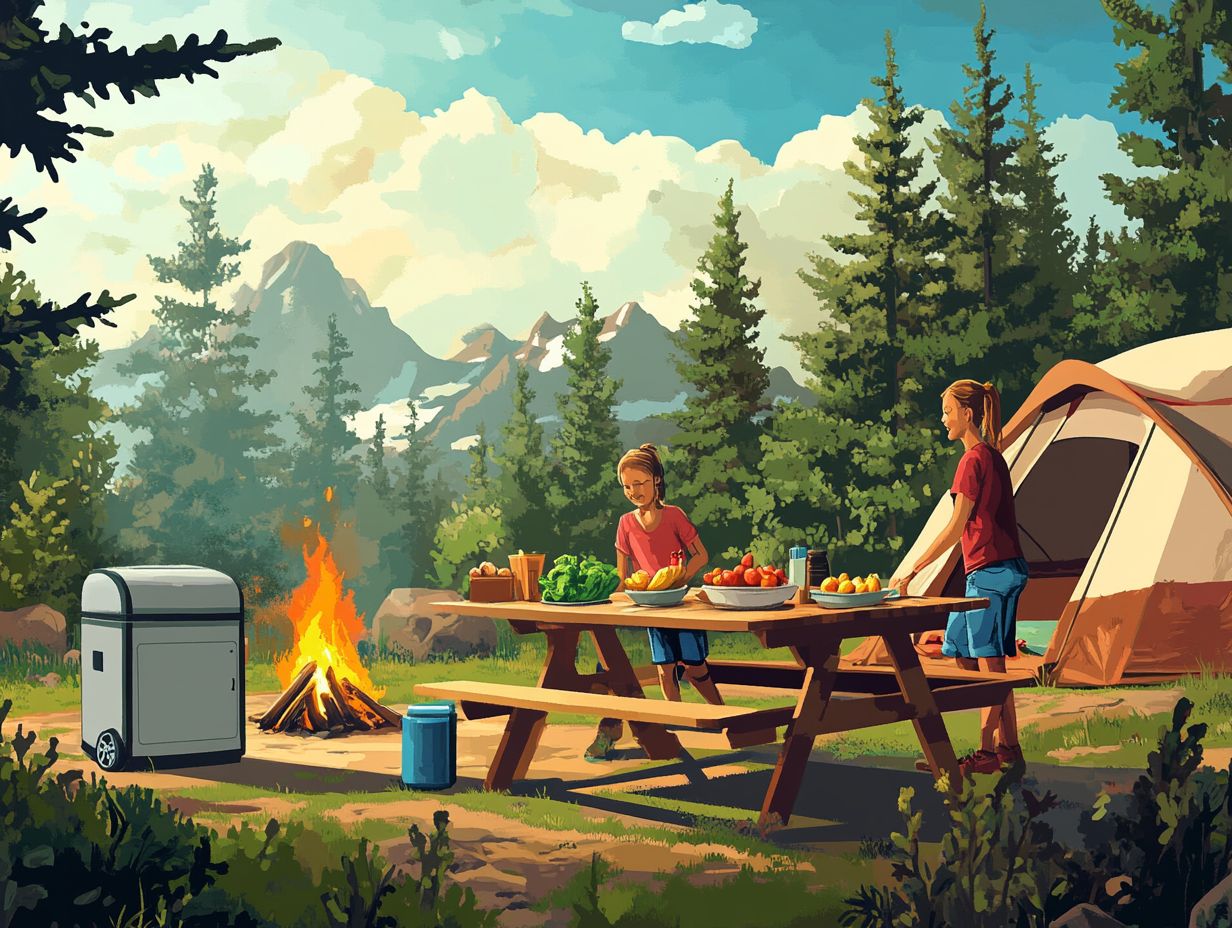
Packing and storing food correctly while camping is crucial. This prevents spoilage and ensures food safety, especially with perishable items like meat and chicken.
By using the right containers and following safe temperature guidelines, you can maintain the integrity of your food. Choose clean, insulated, and leak-proof options to keep everything organized and free from contamination.
For meat and chicken, vacuum-sealed bags are a great choice. They minimize air exposure and extend freshness. Keep your eggs in their original carton to prevent breakage and stop them from absorbing unwanted odors.
As for your vegetables, they thrive in breathable bags. Fruits should be stored in a way that allows airflow to avoid bruising. Don’t forget to label each container with its contents and the date; this ensures nothing gets overlooked during your outdoor adventure.
Cooking and Preparing Food in the Wilderness
Pay close attention to food safety to avoid illnesses while enjoying the great outdoors.
Implement effective hygiene practices and use tools like a thermometer. A thermometer helps check that food is cooked to a safe temperature. This proactive approach reduces the risk of germs that can make you sick, allowing you to enjoy your culinary adventures with peace of mind.
Hygiene Practices and Cooking Methods
Maintaining hygiene practices while cooking outdoors is essential for food safety. Simple steps, like washing your hands with clean water and keeping your cooking surfaces sanitized, can significantly reduce harmful germs.
Everyone involved must prioritize cleanliness, starting with thorough handwashing before and after handling food. Use clean water, such as bottled water, for rinsing your hands and washing fruits and vegetables to effectively eliminate contaminants.
Opt for cooking methods like grilling or boiling to kill harmful bacteria in raw ingredients. Keep a dedicated sanitizing solution for surfaces to protect against cross-contamination, making your outdoor cooking experience safe and enjoyable.
Incorporating a few simple hygiene practices can dramatically enhance health and well-being during your outdoor meals.
Dealing with Waste and Sanitation
Properly managing waste and sanitation is essential for food safety during camping trips. This includes proper disposal of food scraps and waste.
Neglecting this can lead to contamination and attract unwanted wildlife. By effectively handling food scraps and waste, you protect the environment and safeguard your health, reducing the risk of foodborne illness.
Proper Disposal of Food and Waste
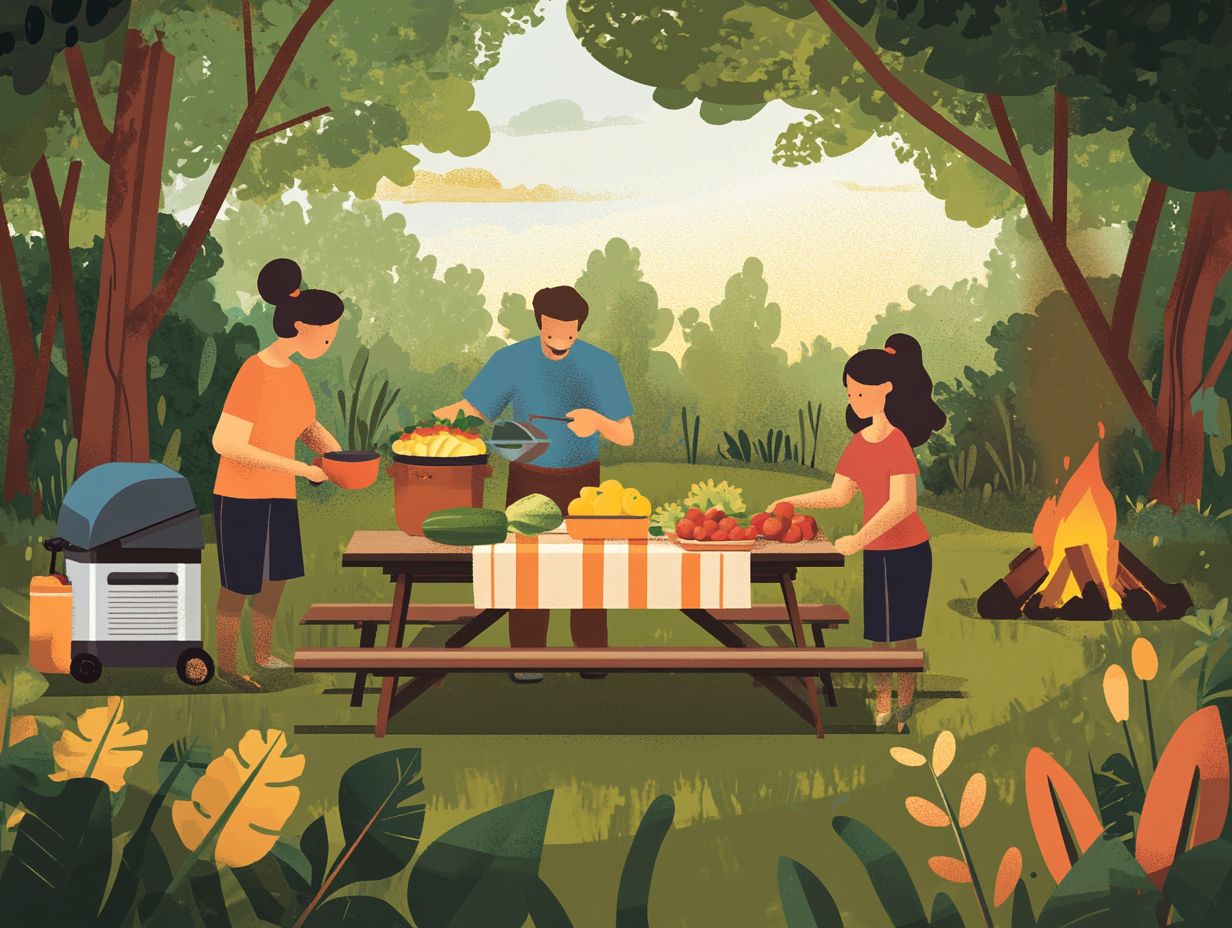
Proper disposal of food and waste is essential when camping. It minimizes the risk of foodborne illnesses and keeps your outdoor space clean.
To manage waste effectively, adopt specific practices:
- Separate recyclables from compostable materials and trash.
- Utilize designated bins or bags to keep your area tidy and prevent accidental litter.
- Cook only what you intend to consume, reducing excess waste.
When dining or preparing food, maintaining a clean environment is crucial. Wipe down surfaces and store food properly, especially meats, to greatly reduce contamination chances. Remember, thorough sanitation is a shared responsibility, ensuring the health of your camping group and the environment.
Follow these tips to ensure a safe and fun camping experience!
Handling Food in Different Environments
Managing food safety in various camping environments is vital for preventing foodborne illnesses and upholding hygiene standards. Whether you’re embarking on a brief hike or enjoying the comforts of an RV, understanding the unique challenges each scenario presents, such as temperature management for perishables, will empower you to adjust your food handling practices with confidence and precision. To ensure your meals stay fresh, check out this guide on keeping food fresh while camping.
Tips for Different Types of Camping (Tent, RV, etc.)
Different types of camping, whether you’re in a tent or an RV, come with unique considerations for food safety and handling. For a safer experience, refer to camping cooking safety practices that can elevate your outdoor cooking experience.
When you’re camping in a tent, store your food in sealed containers to keep wildlife and pesky insects away. Utilize coolers with ice packs to maintain the proper temperature for perishables. Keeping your meat, chicken, and eggs safe is crucial. Set up a designated cooking area away from your sleeping space to minimize exposure to germs.
On the flip side, camping in an RV offers the convenience of built-in refrigeration, which allows for better food management. Regularly check temperatures and rotate items to ensure nothing spoils. This keeps your meals safe and fresh.
No matter where you choose to camp, remember to sanitize your hands before meal prep. Use separate utensils for raw and cooked foods. Additionally, it’s important to learn how to safely dispose of cooking waste while camping. Follow these simple steps to make your adventure safe and unforgettable!
Frequently Asked Questions
What are the best practices for food safety while camping?
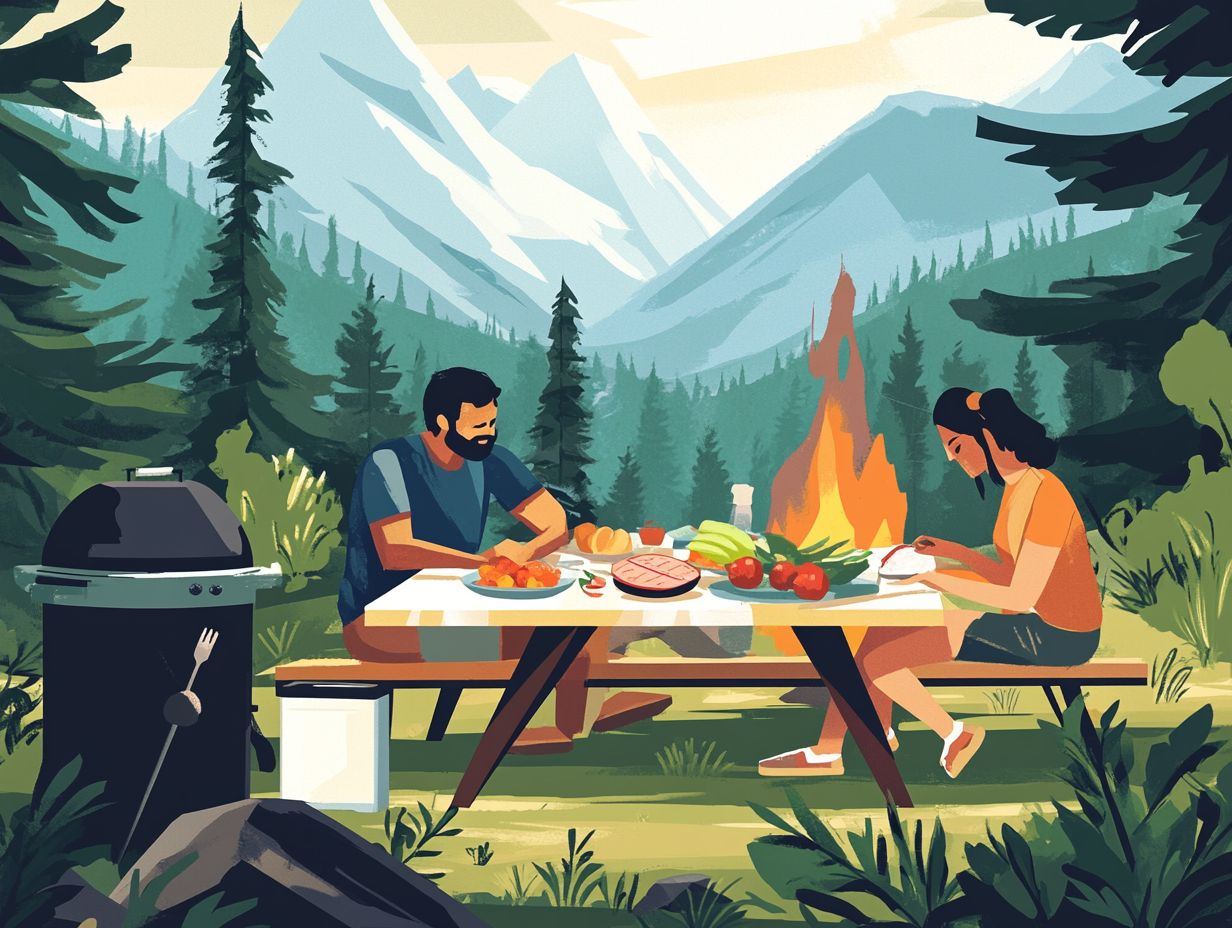
The best practices for food safety while camping include properly storing and handling food, keeping a clean campsite, and using a food thermometer to ensure food is cooked to a safe temperature. For more details on maintaining food safety, check out how to practice safe eating while camping. It’s also important to bring along bottled water for hydration.
How can I store food properly while camping?
When camping, store food in sealed containers or coolers to prevent bacterial growth. To ensure safety, it’s important to know how to avoid food contamination outdoors by keeping raw meats separate from other foods to avoid cross-contamination. Use clean treated water for food preparation.
What are some tips for keeping a clean campsite?
To keep your campsite clean, designate a specific area for food preparation and cleanup. Wash your hands before and after handling food, and dispose of any waste in designated trash bins. Proper sanitation is essential!
Why is using a food thermometer important while camping?
Using a food thermometer ensures that food is cooked to a safe internal temperature, reducing the risk of foodborne illness. This is especially important when cooking meats and poultry.
What should I do with leftover food while camping?
Leftover food should be stored in sealed containers and kept in a cooler with ice. It’s crucial to maintain a safe temperature for perishable foods to avoid bacterial growth, especially on a short hike when refrigeration access may be limited.
Start your camping trip right make food safety your top priority!
Are there any foods I should avoid while camping?
While camping, avoid certain foods to stay safe. Raw or undercooked meats, unpasteurized dairy products, and raw sprouts can increase the risk of foodborne illness. For more information, check out these safe food handling tips for outdoor cooking.
Always check for food safety standards. “ANSI Certification” refers to guidelines that ensure food is prepared safely. Make sure you have access to these guidelines while enjoying the great outdoors!

